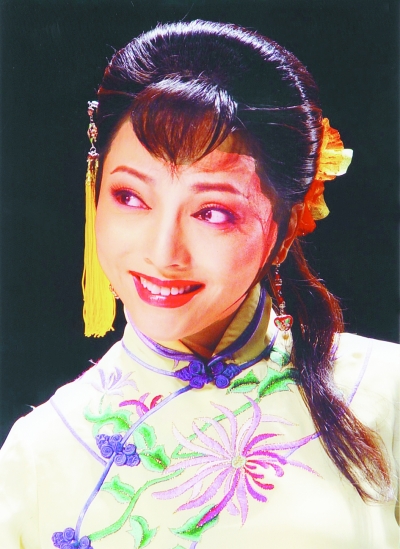Shen Tiemei’s innovative efforts at Sichuan Opera

Shen Tiemei, the national inheritor of Sichuan Opera known as the Queen of Sichuan Opera, is director of the Chongqing Municipal Sichuan Opera Theater, vice-president of China Theatre Association. China’s first Sichuan Opera artist to have a graduate degree for opera performance, she won the Plum Blossom Award for Chinese Theatre for three times. Her works include Jinzi, Li Yaxian and Feng Yi Ting.
As a national inheritor of Sichuan Opera, Shen Tiemei takes every opportunity to advocate for the protection of this intangible cultural heritage. Shen has been devoted to Sichuan Opera all her life.
Shen said that decades ago, she never expected to shoulder the responsibility of inheriting Sichuan Opera. In her childhood, she preferred Peking Opera. She didn’t like the high pitch and noisy instruments of Sichuan Opera; instead, she found the mellow tunes and elegant gestures in Peking Opera charming. Therefore, she learned Peking Opera from her father, a well-known Peking Opera artist in Chongqing Municipality.
When Shen finished high school, she planned to go to a theatre school to learn Peking Opera. It turned out that none of the opera schools were recruiting students of Peking Opera for two years in a row. She was asked to learn Sichuan Opera by her parents, and then her artistic life began at the Sichuan Opera School.
She was reluctant to learn Sichuan Opera at first and even cried a lot because of this. But later, she chose to face reality and was determined to innovate the opera. After half-a-year of learning at school, Shen sang two arias from traditional Sichuan Opera plays Guiying Shooting the Wild Goose and Drunken Concubine at a show, with a sonorous and rough yet mellow and silky voice.
Teachers and students at the show all exclaimed that they never heard such pleasant and beautiful Sichuan Opera. Integrating a quality of Peking Opera and Kunqu Opera in her singing, Shen realized the value of innovation and gained great confidence from the audience’s recognition.
In the play Jinzi, Shen plays the early-20th-century eponymous heroine, who struggles through life with a kind heart and a strong mind. The performance made its debut in 1997, and is still very popular. It has been performed hundreds of times both in China and abroad. When creating the play, Shen collaborated with composer Guo Wenjing and decided to change the traditional musical presentation. They applied the pattern of how instruments were arranged in the symphony to Sichuan Opera, bringing a new feeling to the audience.
Through the new orchestration, the soul of Sichuan Opera was poured into the body of a symphony. In this way, the band and the baton of the conductor all follow the singing of the performers. The voices of artists became the protagonist on the stage.
Moreover, traditional Sichuan Opera plays frequently adopted the high-pitched gao qiang singing style, which is distinguished by solos that are usually accompanied by sparse rhythmical accentuations played with wooden clappers. Ever since she was young, Shen didn’t like this style. As the leading figure in Jinzi, she chose to use a low-pitched singing style instead. Through her shallow and soft singing, the character’s psychological conflict, struggle and depression were all manifested. People realized from her singing that Sichuan Opera can be graceful.
Shen said that innovation doesn’t mean abandoning all traditions. There are elements she must follow. She said she believed that the greatest truths are the simplest. Therefore, she foregoes elaborate costumes, stage arrangements and props. Instead, she pursues simplicity. For example, in Jinzi, there are only 12 people in the band and six people on the stage. Through innovation in performance and singing, Shen initiated a path for traditional opera to express itself in the modern age, bringing new life and significance to the opera.
